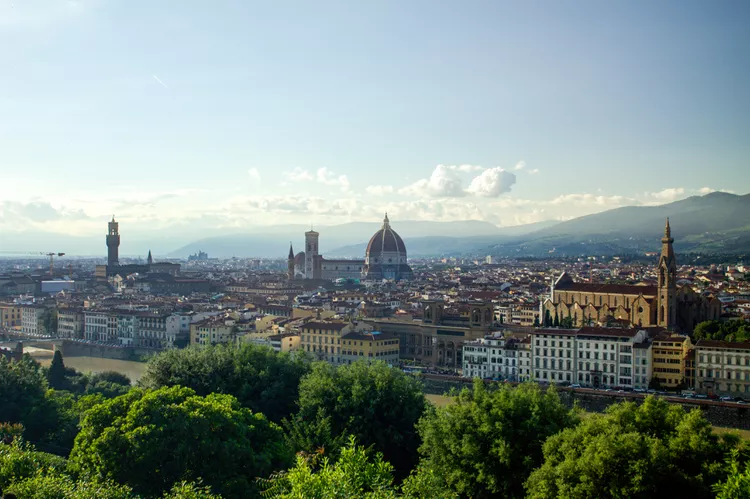Florence Travel Guide Overview
- Introduction
- When to Go
- Where to Stay
- Top Attractions
- Food and Drink
- Transportation
Florence is in the heart of Italy’s Tuscany Region in western Italy along the Arno river. It is 145 miles north of Rome and 185 miles south of Milan. Florence is the capital of the region of Tuscany, and has a population of around 400,000 people, with around 300,000 more in suburban areas.
When to Go
The narrow lanes of Renaissance Firenze are often congested with tourists in July and August. Therefore, spring (April and May) or autumn (September and October) are much more favorable times to visit, although these months are still part of the tourist season. Additionally, many travelers arrive in Florence during Easter. November can also be a suitable option, provided you bring warm clothes and are prepared for some rain.
Where to Stay
Most visitors prefer to stay in the historic center to admire Florence’s stunning Renaissance architecture. However, accommodations in the hills surrounding Florence can also provide a rewarding experience. Consider the charming Villa Le Piazzole, where a short and pleasant walk takes you directly to the Ponte Vecchio.
Top Attractions
- Florence’s Archaeological Museum: Housed in a grand palace featuring impressive Egyptian and Etruscan collections. Location: Via della Colonna, Admission costs less than 5 Euros.
- Baptistry of John the Baptist: This structure dates back to the 11th century and boasts three remarkable sets of bronze doors.
- Il Duomo (Cattedrale de Santa Maria del Fiore): This magnificent Gothic cathedral was initiated in 1296 and consecrated in 1436. Visitors can climb the 463 stairs for breathtaking vistas of Florence. Location: Piazza del Duomo. Entrance is free, but expect longer wait times in summer. Additional fees for excavations and access to the cupola.
- Uffizi Gallery: Set within a historic 1560 Medici palace, recent renovations have improved visitor flow and expanded gallery space, offering splendid views of Florence from the upper levels. Location: Piazzale degli Uffizi 6, with entry fees of 12 Euros from November to February and 20 Euros from March to October.
- Palazzo Vecchio (Old Palace): This Romanesque town hall features a replica of Michelangelo’s David outside. Tours are recommended for a deeper exploration of its historical significance.
- The Pitti Palace and Boboli Gardens: This royal palace includes several museums and houses masterpieces by Italy’s acclaimed artists. The picturesque Renaissance gardens are a highlight. Location: Piazza Pitti, south of the Arno. Various entry fees apply.
- Dante’s House (Casa di Dante): Though lesser-known, it provides a fascinating glimpse into the life of the famous poet. Location: Via S. Margherita, 1, Entry fee is 3 Euros, closed Tuesday.
- The Ponte Vecchio: This historic bridge, which survived WWII bombing, features charming shops today. Although it has shifted from a medieval marketplace to a hub for jewelry, it’s a delightful sight. Free entry, but be cautious of wandering salesmen.
- The Church of San Lorenzo: While it may not appear impressive from the exterior, it is one of Florence’s oldest religious structures, possibly founded before 400 AD, containing significant artworks.
Food and Drink
Tuscan cuisine is globally revered for its simple yet delightful combinations of fresh ingredients. A must-try dish is the Florentine T-Bone bistecca alla fiorentina, which can be quite hefty when priced per 100 grams. Additionally, try the local specialties, including tripe and ribollita, a traditional bread soup. Popular Tuscan appetizers include crostini and bruschetta, which are toasted bread topped with various ingredients.
Best Breakfast: Cucciolo Bar Pasticceria: This venue is famous for its Bombolone, a Tuscan doughnut, which is freshly made and served directly from the kitchen. Your breakfast bombolone couldn’t be fresher!
Lunch in the Market: While navigating through the busy Piazza di San Lorenzo marketplace, look for Piero’s favorite spot: Trattoria Gozzi. This eatery serves “simple Tuscan food” and tends to be very popular; arriving early is advisable if you wish to avoid long wait times.
Drinks With a View at Biblioteca de le Oblate: This former convent features a second-floor café with stunning views of the duomo. Although a historical library resides on the premises, the café is the highlight for many visitors.
Transportation
Florence’s public transportation relies on ATAF and LI-NEA. Tickets and bus passes are available at the ATAF booth at Piazza Stazione, where you can also obtain bus timetables. Additionally, bus tickets can be purchased at any tobacconist marked with a large “T” that displays an orange A.T.A.F. sticker. All tickets should be validated in machines on board the buses. Late-night tickets (from 9:00 PM to 6:00 AM) can typically be bought from the bus driver.
Taxis
Taxi services in Florence are provided by companies like Taxi Radio and Taxi Socota. Socota is the larger of the two services. Instead of hailing a taxi, it’s recommended to visit a taxi stand or arrange for a cab through a phone call.
Parking
Florence features a dedicated website for parking. To find parking lots, click on “Parcheggiare” for a helpful map.




